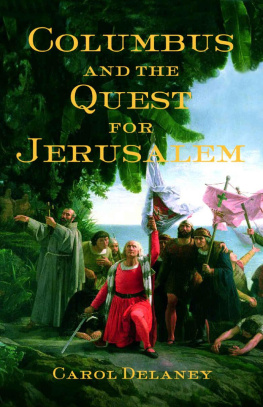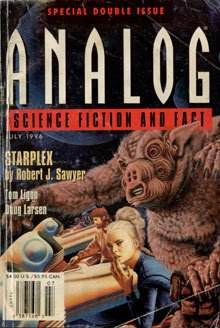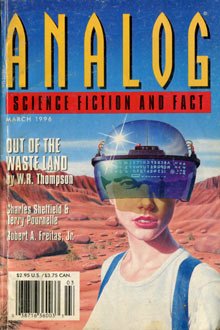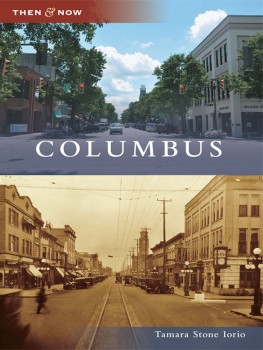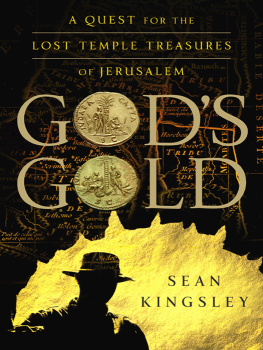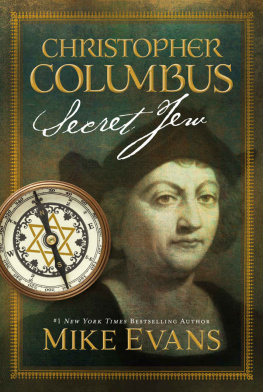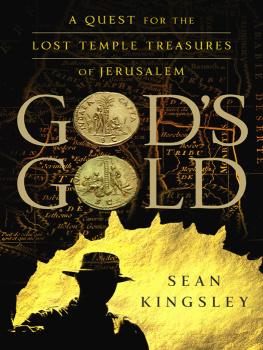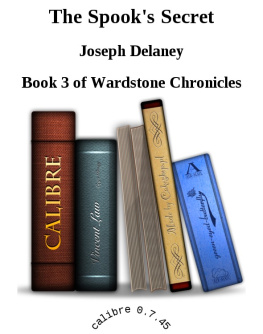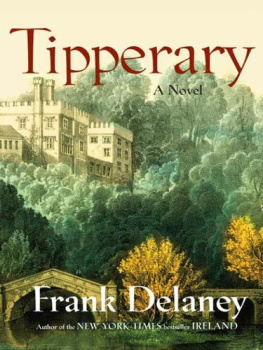Carol Delaney - Columbus and the Quest for Jerusalem
Here you can read online Carol Delaney - Columbus and the Quest for Jerusalem full text of the book (entire story) in english for free. Download pdf and epub, get meaning, cover and reviews about this ebook. year: 2011, publisher: Free Press, genre: Religion. Description of the work, (preface) as well as reviews are available. Best literature library LitArk.com created for fans of good reading and offers a wide selection of genres:
Romance novel
Science fiction
Adventure
Detective
Science
History
Home and family
Prose
Art
Politics
Computer
Non-fiction
Religion
Business
Children
Humor
Choose a favorite category and find really read worthwhile books. Enjoy immersion in the world of imagination, feel the emotions of the characters or learn something new for yourself, make an fascinating discovery.
- Book:Columbus and the Quest for Jerusalem
- Author:
- Publisher:Free Press
- Genre:
- Year:2011
- Rating:5 / 5
- Favourites:Add to favourites
- Your mark:
- 100
- 1
- 2
- 3
- 4
- 5
Columbus and the Quest for Jerusalem: summary, description and annotation
We offer to read an annotation, description, summary or preface (depends on what the author of the book "Columbus and the Quest for Jerusalem" wrote himself). If you haven't found the necessary information about the book — write in the comments, we will try to find it.
Columbus and the Quest for Jerusalem — read online for free the complete book (whole text) full work
Below is the text of the book, divided by pages. System saving the place of the last page read, allows you to conveniently read the book "Columbus and the Quest for Jerusalem" online for free, without having to search again every time where you left off. Put a bookmark, and you can go to the page where you finished reading at any time.
Font size:
Interval:
Bookmark:


Thank you for purchasing this Simon & Schuster eBook.
Sign up for our newsletter and receive special offers, access to bonus content, and info on the latest new releases and other great eBooks from Free Press.

or visit us online to sign up at
eBookNews.SimonandSchuster.com


Map of the Four Voyages. Prepared by Lynn Carlson, GISP.

To Columbus, whose extraordinary journey made mine possible

Free Press
A Division of Simon & Schuster, Inc.
1230 Avenue of the Americas
New York, NY 10020
www.SimonandSchuster.com
Copyright 2011 by Carol Delaney
All rights reserved, including the right to reproduce this book or portions thereof in any form whatsoever. For information address Free Press Subsidiary Rights Department, 1230 Avenue of the Americas, New York, NY 10020.
First Free Press hardcover edition October 2011
FREE PRESS and colophon are trademarks of Simon & Schuster, Inc.
The Simon & Schuster Speakers Bureau can bring authors to your live event. For more information or to book an event contact the Simon & Schuster Speakers Bureau at 1-866-248-3049 or visit our website at www.simonspeakers.com .
Designed by Carla Jayne Jones
Manufactured in the United States of America
1 3 5 7 9 10 8 6 4 2
Library of Congress Cataloging-in-Publication Data
Delaney, Carol Lowery
Columbus and the quest for Jerusalem / Carol Delaney. 1st Free Press hardcover ed.
p. cm.
1. Columbus, ChristopherReligion. 2. AmericaDiscovery and explorationSpanish. I. Title.
E112.D39 2011
970.015092dc23 2011022360
ISBN 978-1-4391-0232-9
ISBN 978-1-4391-0996-0 (ebook)
 C ONTENTS
C ONTENTS 
 P ROLOGUE
P ROLOGUE 
T his is the story of a boy, born to a family of modest means, who grew up to become the most famous mariner of all time and whose discovery changed the world forever. The story has been told so many times you would think there was nothing more to tell, but the very profusion of books about him suggests that there is something still unresolved.
The story of Columbus does not begin or end with the landfall on an island in the Bahamas on October 12, 1492the date and event most often associated with him. That day was important to him only because it confirmed what he had been arguing about for years, namely that the Ocean Sea could be crossed. His crew and the three small ships, whose names are almost as famous as his own, had only two days rest before they were off again, sailing among islands in the Caribbean in search of the Asian mainland and the Grand Khan. Another date to begin the story might be March 15, 1493, for on that day Columbus arrived back in Spain, and that is when Europe learned of his discovery. Had he perished at sea, his name would have perished with him and so, too, any knowledge of his achievement. To me, however, December 26, 1492, is the most important date, for on that day he revealed his motivation and the ultimate goal of the voyagethe vision that would sustain him until the day he died. In his diary, he promised the Spanish sovereigns that in three years time he would find enough gold and spices to finance a crusade to
conquer the Holy Sepulcher; for thus I urged Your Highnesses to spend all the profits of this my enterprise on the conquest of Jerusalem.
 I NTRODUCTION
I NTRODUCTION 
T HE P ASSIONS OF C OLUMBUS
A few years ago, had anyone said I would write a book about Columbus, I would have laughed. To me, Columbus had been a quasimythical figure; I knew nothing about him beyond what every schoolchild of my generation learned, which was not much. I didnt know he had made four voyages, or that he had returned from one of them in chains. Even the Quincentennial of 1992, commemorating his Discovery of America, passed me by.
Everything changed during the fall of 1999 when I was teaching a class at Stanford University called Millennial Fever. The purpose was to observe the apocalyptic frenzy that was gripping America at the turn of the Christian millennium and to explore some of the history of millennial thought. In one of the readings for the course I came across a reference to Columbus and his apocalyptic, millennial beliefs. I learned that Columbus believed his role was to obtain enough of the fabled gold of the East to launch a crusade to conquer Jerusalem in order to prepare for the Second Coming of Christ before the end of the world. I had never heard about these beliefs of Columbuss, nor had anyone else whom I asked. The idea that he envisioned his project as part of the Christian apocalyptic scenario took hold of me and didnt let go.
I spent a summer at the John Carter Brown Library at Brown University in Providence, Rhode Island, exploring its rich collection of material related to the Columbian encounter and seeking the expertise of its knowledgeable staff and fellows. Little did I know that it would change the course of my life. I applied for and received a fellowship for the following year, decided to retire from my teaching position at Stanford, drove across the country again, and settled in Providence to pursue the research for this book. A whole new world opened up for me as I sat riveted to my seat in the librarys elegant reading room from the moment it opened until it closed. I read voraciously about Columbus, about fifteenth-century Europe, and about medieval apocalypticism.
The more I read by and about Columbus, the more dissatisfied I became with portrayals of him as if he were our contemporary, as if only his clothes or his ships were different from ours, or as if medieval Christianity were merely a belief system he could choose and not the world that enveloped him. Most scholars of Columbus have focused on what he did but there is comparatively little written on why. They have tended to ignore his religious motivation or dismissed it as a way to ingratiate himself with Queen Isabella. Only a handful have taken his apocalyptic, millennial views seriously, and their publications have not reached the general public. a journey very few academics have wished to take.
I am a cultural anthropologist and, unlike historians, we typically go off to another country to study living people. There is usually a lengthy period of fieldwork in a culture where the language, values, orientations in space and time, notions about human nature, gender, kinship and the meaning of life are often quite different from what many of us take for granted. This prolonged examination of cultural subtleties makes anthropologists keenly aware of the intimate connection between peoples beliefs, their actions, and the cultural context in which they live. I, for example, lived for several years in a relatively remote village in Turkey and quickly realized that Islam was not separate from the rest of the villagers lives, but the very context for them. Islam was the master narrative within which people understood the world and its meanings. A religious narrative, like history, is a story that explains how things got to be the way they are. for people in Columbuss milieu, the master narrative was medieval (Catholic) Christianity.
Next pageFont size:
Interval:
Bookmark:
Similar books «Columbus and the Quest for Jerusalem»
Look at similar books to Columbus and the Quest for Jerusalem. We have selected literature similar in name and meaning in the hope of providing readers with more options to find new, interesting, not yet read works.
Discussion, reviews of the book Columbus and the Quest for Jerusalem and just readers' own opinions. Leave your comments, write what you think about the work, its meaning or the main characters. Specify what exactly you liked and what you didn't like, and why you think so.

